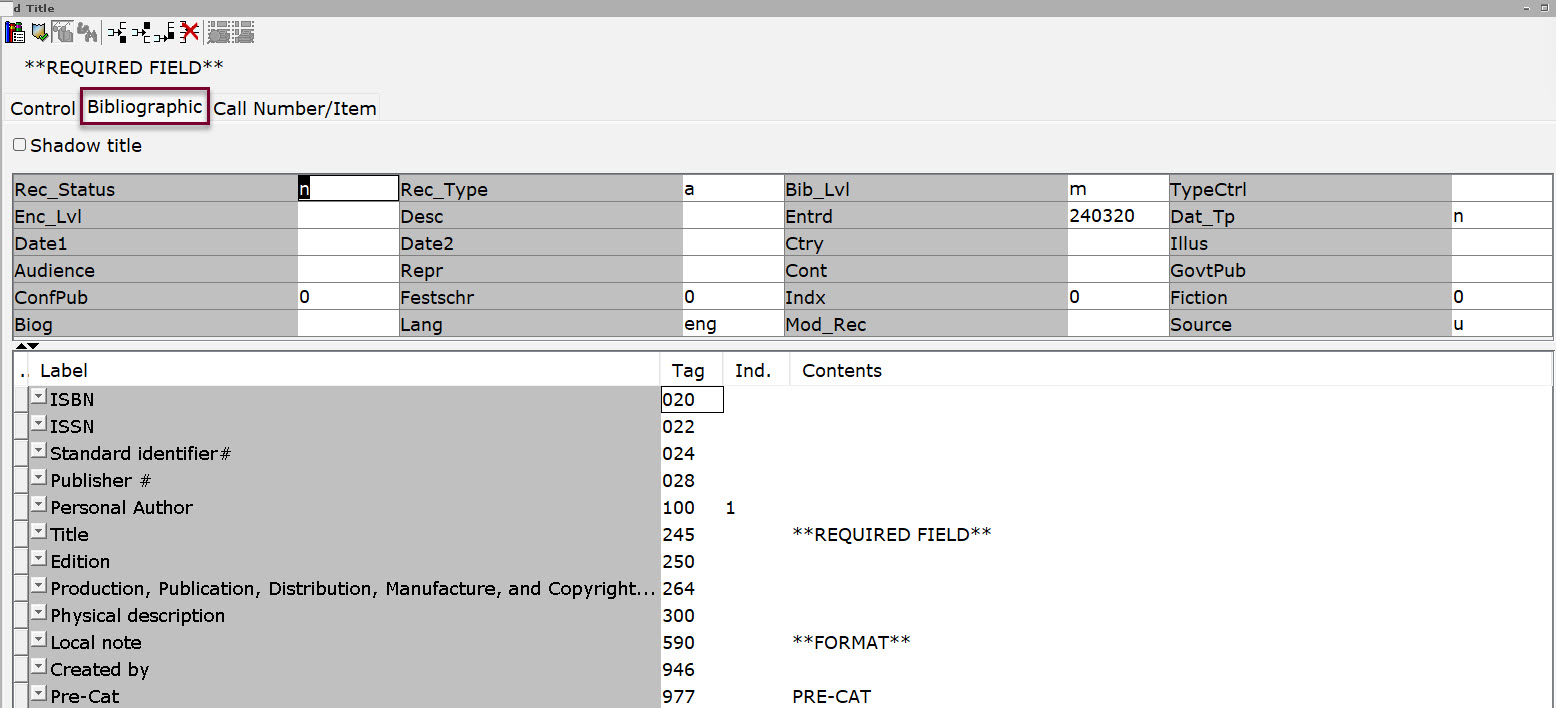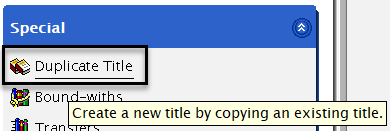Required fields
This is a reference to the fields required in a pre-cat record. This guide will help you create pre-cats for books. For information on special considerations for audiovisual materials, please refer to Creating Pre-Cats for Audiovisual Materials.
MARC tags have subfields that require proper punctuation and are preceded by | (pipe sign).
There is no space between the pipe sign, the subfield code, and the word right after it.
020 - ISBN (required if applicable)
Record the ISBN of your book in this field according to the following guidelines.
- If ISBNs for multiple bindings are provided, please provide additional ISBNs in repeated fields.
- List only one ISBN per field.
- Only 13-digit ISBNs are required. including the 10-digit equivalent is optional.
- Do not include hyphens or spaces.
100 - Author (required if applicable)
Record the primary author or entity responsible for the item. This may also be an editor, illustrator, photographer, business, or government.
- Record personal names in the format "Last Name, First Name."
- Record names as they appear on the item. It is not necessary to include birth dates, roles, or pseudonyms.
- List only one name in the 100 field. If there are additional names, you may optionally include them in 700 fields.
- It is possible to have an item with no primary creator. In that case, leave this field blank or delete it.
245 - Title statement (required)
This is the most complex field in a pre-cat record. It is the only field in the pre-cat workform that requires you to pay attention to indicators because these may impact how the record displays in the Aspen catalog.
Record the title exactly as it appears on the item. If your title includes a subtitle, that is transcribed in subfield |b.
Indicators
- The first indicator will be zero if the record does not have a 100 or 110 tag.
- If the record contains the 100 or 110 tag, the first indicator will be 1.
The second indicator is a "non-filing character" value. This indicates the number of characters to skip before positioning the title in an alphabetic list. This is used to account for initial articles, which are the words A, An, The, and their Non-English equivalents. Count the number of letters in the initial article and the space following it.
245 12 A soldier of fortune
245 14 The wonderful world of Dr. Seuss
245 13 La casa en Mango Street
245 13 An experience out of this world.
** Note: if there is an author in the 100 or 110 tag, the first indicator must be 1.
Subtitle - Subfield |b
If your title has a subtitle, enter it in the same way as the following example, preceded by subfield |b.
245 10 Dogs :|bextraordinary photographs of wonderful dogs
Statement of responsibility - Subfield |c
The statement of responsibility transcribes the people or organizations that created the item. This will always include the entity listed in the 100 field as well as any others that will be listed in 700 tags. Transcribe this exactly as it appears on the item as in the following example:
245 10 Dogs :|bextraordinary photographs of wonderful dogs /|ccreated by Rick Smolan and David Elliot Cohen.
Following the title or subtitle, there is a space, followed by a forward slash, the subfield |c, and the statement of responsibility.
245 tag punctuation:
: (colon) before subfield |b
/ (forward slash) before subfield |c
. (period) at the end
250 - Edition statement (required if applicable)
This field holds edition statements transcribed directly from the source. Each edition of a work gets a unique bibliographic record, so you should always record this when you see one.
Examples:
250 Director's cut edition.
250 Explicit edition.
You should also use this field to record console information for video games and part information for Blu-Ray/DVD combo packs. See Creating Pre-Cats for Audiovisual Materials for more information.
264 - Publication information (required)
This field contains information about the publisher, label, or entity responsible for printing and distributing the item. Publication date is also represented here. Like the 245, subfield divisions are critical to this field.
Place of publication
The first element recorded in the field is the place of publication. Record the place as found on the title page or wherever else it can be found. If multiple places of publication are listed, record only the first. If absolutely no location information is available, you may skip this subfield and begin with subfield |b.
Publisher - Subfield |b
Enter the publisher, record label, production company, or entity here. As with subfield |b of the 245, precede this subfield with a space, and a colon:
264 1 New York :|bSt. John's Press
264 1 London :|bEMI Recording
If you did not record a place of publication, the field will look like the following example:
264 1 |bPelham Bay Press
Record this information as it is seen on the item. Choose the most prominent entity, whether it is a publisher, imprint, or printer.
Publication year - Subfield |c
Place a comma at the end of the publisher's name and record the publication year in |c immediately following. Record only the year and ignore any month or day information.
264 1 New York :|bSt. John's Press,|c2017.
You can ignore copyright information if it differs from the publication year. Generally, copyright dates are not neccessary in a pre-cat record, but if copyright is the only year present, you may use that instead.
Note: Every pre-cat record must have a date in 264 subfield |c. This date is harvested by SirsiDynix and used in the sorting of search results. Records without a date may not be prominently displayed in WorkFlows searches or on Enterprise.
264 tag punctuation:
: (colon) before subfield |b
, (comma) before subfield |c
. (period) at the end
300 - Physical description (required if applicable)
The 300 field is where you can record information on the length, content, and size of the material. Often this information will not be available if you are creating a pre-cat for an item that is not in hand. Do your best to record something in this field, as it is useful to both SWAN catalogers and your patrons. If absolutely no information is available, this field can be omitted.
Extent
The first element of this field is known as the "extent". It can contain one of two things. For books, it usually contains a pagination:
300 565 pages
For non-book items, it expresses number of physical pieces in the item:
300 12 audio discs 300 1 Blu-ray disc 300 1 computer chip cartridge
Please do not use "sound disc" in this field as it is not a valid RDA term.
You may use a similar construction if a book does not have pagination and counting the pages would be unreasonable:
300 1 volume (unpaged)
590 - Format
SWAN uses the 590 field for custom format vocabulary. Every bibliographic record that does not represent a standard-print book needs a 590 field with the appropriate term. Bibliographic records for a standard-size print book should not contain a 590 format field.
See 590 Field: SWAN Format.
700 - Additional names (optional)
Use this field to record additional names that are not in the 100 field. This is a good place to list illustrators, performers, additional authors, and anybody else who may be critical in identifying the item. This is optional for pre-cat creation. Follow the same formatting guidelines as the 100 field.
Names that appear in the 700 tag should be included in subfield |c of the 245 tag.
946 - Signature tag
The 946 is a required pre-cat tag. It contains your library three-letter code, your initials, and the date the pre-cat was created.
Enter it in this format:
Library 3-letter code/your initials/YYYYMMDD
Example:
BYS/AB/20240131
977- PRE-CAT
The 977 PRE-CAT (in CAPS) is automatically added to pre-cat records. If your library uses Acquisitions, please make sure vendor records include the 977 tag.
Fixed field (required)
The fixed field refers to the block of data positioned above the MARC tags. For the purpose of pre-cat creation, most of this data can be left at the default values that appear in your template. The exception is the field labeled "Fiction".
When inputting a record for a book, audiobook, or pre-loaded audio player, this field needs to be addressed. Please enter a 0 or 1 in this field:
0 - Nonfiction
1 - Fiction
This field is crucial to ensuring that item attached to this bibliographic record are assigned an appropriate Item Category 3 and can be filtered in the Aspen catalog.
If your item is not a book, audiobook, or pre-loaded audio player, this field can be disregarded.




